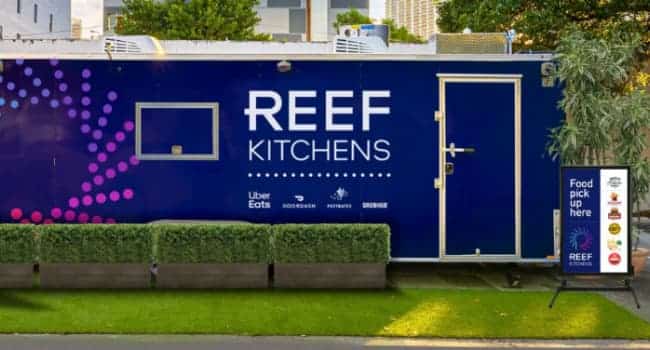Reef Technologies is a food tech company that does things a bit differently. And that’s saying a lot in an industry that is introducing robot waiters and NFTs into the local dining experience.
This Miami-based company has been doing innovative things with the intersection of virtual dining and mobility.
Reef’s mission has been to transform urban spaces into “proximity hubs that create jobs and bring new goods, services, and experiences to neighborhoods across the globe.” This translates into Reef deploying food trucks into parking lots (its original business). This practice has occasionally landed Reef in trouble. Including one exploding food truck in Houston.
Reef also went on a global acquisition streak last year aimed at fashioning itself into a ghost kitchen powerhouse. That may seem like a more dubious ambition today than just six months ago, given the current volatile tech environment.
Last November, Reef acquired Dubai-based ghost kitchen platform iKCon. A month later it announced the acquisition of Chicago-based 2nd Kitchen, a startup founded in 2017 to provide technology that allows businesses that don’t otherwise serve food to offer ordering and delivery from nearby restaurants. So a bar that only serves drinks or an events space, can partner with 2nd Kitchen to provide food in essence without opening their own kitchens.
Reef has also partnered with major brands and celebrities to launch virtual dining concepts. For example, in November it partnered with DJ Khaled to launch a virtual restaurant, Another Wing, across three continents, in five countries, and 18 U.S. states with over 150 locations. Celebrities opening virtual restaurants feels very 2021 now.
A Ghost Kitchen for Real People
Reef’s latest venture is both ambitious and practical. Reef has launched the getREEF Virtual Food Hall (I think “food hall” is foodie for “food court”) at the Raleigh-Durham Airport. Basically airport goers can order meals from various food concepts on an app or on a kiosk.
The orders are prepared in a ghost kitchen. And travelers collect the order at food lockers at a location in Terminal 2 at the airport, near the ordering kiosk. Reef says in the future, travelers will have the option to have the food delivered to their gates.
“RDU’s ghost kitchen allows travelers to order from nine different restaurants from their smartphone phone or kiosk in one seamless transaction,” said Michael Landguth, president and CEO of the Raleigh-Durham Airport Authority. “The virtual kitchen uses cutting edge technology to provide more dining options, added convenience, and a contactless ordering and payment experience.”
The food hall includes six national virtual food brands including Krispy Rice, 800 Degrees Pizza, Pei Wei, Xochimex Cantina Grill, Zinburger, and Rebel Wings. The hall also includes three local brands — Beyu Caffé, Hubb Kitchen, and American Meltdown.
What is most compelling about the getREEF Virtual Food Hall is the intersection of the virtual and real worlds. Anyone who has stood in a miserable airport McDonald’s line at 6 a.m. waiting for order number 376 (coffee and a Sausage McMuffin) will yearn for the ability to order (presumably) edible food on an app and then grab it from a locker. Assuming the process is optimized, this sounds like a much better experience. Though in fairness, almost anything does.

What’s Next for Pandemic Darlings?
While innovation keeps on coming in food tech, these are not the easiest times for this industry.
As we return to whatever normal ends up being, we’re seeing a pattern emerge. Businesses that seemed like great ideas in 2020 are looking pretty shaky today. This applies to event tech to quick commerce, as well as elements of food tech and other businesses that may have overestimated the degree to which we would carry on living in a contactless, hermetically sealed manner once Covid evolved from a deadly pandemic to an endemic illness we just have to live with.
Opinions vary on where we are in that evolution, but we seem closer to the endemic than the pandemic stage. At least in terms of how the public regards the virus.
No doubt some of what we have seen reflects the broader pain being felt by high-growth tech companies. But much of it is very specific to pandemic-friendly startups. The bloodletting taking place in quick commerce is perhaps the best example. But it’s far from the only sector feeling the pain.
This offers some context for why Reef’s virtual airport food hall is so interesting. It seems to be a truly IRL application of the virtual dining concept.
Reef Technologies, by the way, hasn’t been spared from the post-Covid reckoning facing many in the food tech space. As we reported last week, Reef is planning to reduce its own headcount by 5%.




